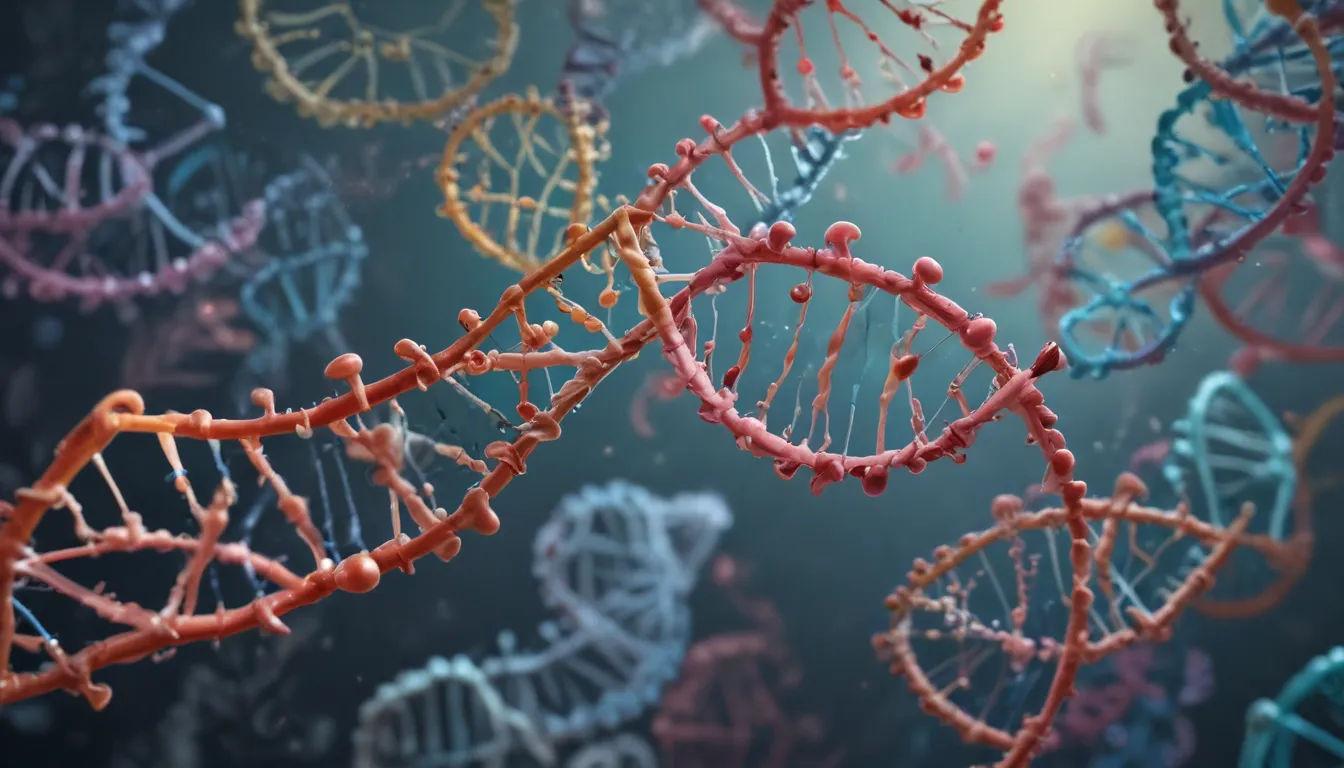A Note About Images: The images used in our articles are for illustration purposes only and may not exactly match the content. They are meant to engage readers, but the text should be relied upon for accurate information.
Genome annotation is a fundamental aspect of genetics, shedding light on the intricate workings of genes within an organism. By identifying and labeling genes in DNA sequences, scientists gain valuable insights into genetic codes, biological processes, and potential functions. In this article, we will explore the fascinating world of genome annotation, uncovering 20 astounding facts that will captivate your curiosity and deepen your understanding of this essential field.
Deciphering the Genetic Code: Exploring Genome Annotation
Genome annotation plays a crucial role in unraveling the mysteries of life by providing a systematic approach to understanding genetic makeup. Let’s dive into the key takeaways that highlight the significance of genome annotation:
- Genome annotation enables scientists to comprehend the genetic composition of organisms and identify disease-causing mutations, paving the way for potential treatments.
- By annotating genomes, researchers can pinpoint genes, analyze genetic variations, and develop personalized therapies based on individual genetic profiles.
The Evolution of Genome Annotation: A Historical Perspective
The monumental Human Genome Project revolutionized genome annotation by furnishing a comprehensive reference sequence for the human genome. This pivotal undertaking propelled the field forward, laying the groundwork for in-depth genetic studies.
Locating Genetic Treasures: The Quest for Genes
A fundamental objective of genome annotation is to locate and annotate protein-coding genes within a genome, providing researchers with critical insights into the genetic blueprint of an organism.
From Genome to Disease: Unveiling Disease Mechanisms
Annotated genomes offer essential information for studying genetic disorders, enabling scientists to identify disease-causing mutations and variations, leading to a deeper understanding of genetic conditions and potential treatment avenues.
Algorithms at Work: The Role of Gene Prediction Algorithms
Gene prediction algorithms play a vital role in genome annotation by analyzing DNA sequences to predict gene locations and structures. These computational tools employ diverse methods to identify potential coding regions within genomes.
Beyond Protein-Coding Genes: The Intriguing World of Non-Coding DNA
Contrary to popular belief, only a fraction of the genome encodes proteins, while non-coding regions, often termed “junk DNA,” play crucial regulatory roles in gene expression.
Unveiling Gene Functions: The Power of Annotation
Genome annotation aids scientists in assigning functions and attributes to genes based on experimental evidence and existing knowledge, facilitating the study of gene interactions and pathways.
The Continuous Journey: Genome Annotation as a Dynamic Process
As knowledge and technologies advance, genome annotations undergo continuous revision to reflect the latest insights into gene structure and function, ensuring an up-to-date understanding of genomes.
Identifying Regulatory Elements: A Closer Look at Genome Annotation
In addition to protein-coding genes, genome annotation involves identifying regulatory elements such as promoters, enhancers, and transcription factor binding sites, which govern gene expression.
Comparative Insights: The Significance of Comparative Genomics
By comparing annotations of different genomes, scientists can glean insights into evolutionary relationships and gene conservation across species, enriching our understanding of genetic diversity.
Unlocking Gene Functions: The Role of Functional Annotation
Functional annotation involves associating genes with specific biological functions or roles based on sequence similarities, protein domains, and other features, guiding drug discovery and therapeutic interventions.
Aiding Drug Discovery: The Impact of Genome Annotation
Understanding annotated genes and their functions serves as a beacon for drug development, as genome annotation contributes to the identification of potential drug targets, driving advancements in therapeutic strategies.
Embracing Genomic Diversity: Studying Genetic Variations
Annotated genomes enable scientists to identify and characterize genetic variations, including single nucleotide polymorphisms (SNPs) and structural variations, fostering insights into genetic diversity.
Evolutionary Mysteries Unveiled: Genome Annotation and Genome Evolution
Comparing annotated genomes of various organisms unravels the mechanisms of genome evolution, shedding light on gene duplications, insertions, deletions, and other evolutionary processes.
A Blend of Methods: Balancing Computational and Experimental Approaches
While computational methods are essential for gene prediction, direct experimental evidence such as transcriptomic and proteomic data is critical for validating and refining annotations, ensuring accuracy in genome annotation.
Delving into Repetitive Sequences: Understanding Genome Complexity
Genome annotation aids in unraveling the roles of repetitive sequences, which contribute significantly to the genome, playing essential functions in chromosomal structure maintenance and gene regulation.
Connecting the Dots: Functional Annotation and Biological Pathways
By annotating genes with their functions, scientists can link them to specific biological pathways, enhancing our understanding of intricate biological processes and regulatory networks.
Targeting Disease Genes: Genome Annotation for Therapeutic Discovery
Through genome annotation, researchers can pinpoint genes associated with various diseases, guiding targeted investigations and potential therapeutic interventions, revolutionizing disease management approaches.
Exploring Epigenetic Landscapes: Genome Annotation and Epigenetic Modifications
Genome annotation helps identify and characterize epigenetic modifications such as DNA methylation and histone modifications, key players in gene regulation and cellular functions.
The Era of Precision Medicine: Genome Annotation and Personalized Healthcare
By annotating individual genomes, precision medicine approaches can be tailored to individuals based on their genetic profiles, revolutionizing healthcare practices and treatment strategies.
Conclusion: Unraveling the Genetic Tapestry
In conclusion, genome annotation stands as a cornerstone of genetic research, offering unparalleled insights into the intricate world of genetics. From gene functions to disease mechanisms, genome evolution to therapeutic discoveries, the impact of genome annotation reverberates across diverse scientific realms. As technology advances, genome annotation promises to unveil genetic mysteries at unprecedented levels, shaping the future of biological research and healthcare.
FAQs: Navigating Genome Annotation
-
What is genome annotation?
Genome annotation is the process of identifying and decoding various elements within a genome, including genes, regulatory sequences, and non-coding regions. -
Why is genome annotation important?
Genome annotation is crucial for understanding gene functions, disease mechanisms, genetic variations, and evolutionary relationships between species, laying the foundation for numerous biological research endeavors. -
How is genome annotation performed?
Genome annotation combines experimental techniques such as DNA sequencing with computational methods to analyze genomic data, predict genes, and annotate genetic elements. -
What are the applications of genome annotation?
Genome annotation applications include disease research, drug discovery, crop improvement programs, and evolutionary studies, providing valuable insights into genetic landscapes and biological processes. -
How accurate is genome annotation?
Genome annotation is a highly accurate process, although challenges exist in identifying complex genes and non-coding regions. Ongoing advancements in technology and computational algorithms aim to enhance annotation precision.
Embark on a scientific journey through the captivating realm of genome annotation, where genetic mysteries await discovery, and the code of life unfolds before your eyes. Join us in unraveling the intricate tapestry of genetics, exploring the boundless possibilities that genome annotation offers in shaping our understanding of life’s intricate mechanisms. Dive into the world of genetics, where every annotation unveils a new chapter in the saga of genetic exploration.




